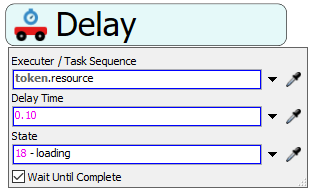Hi there. There are two stations, lots of boxes, task executers(TEs), and timetables for TEs to leave these stations loaded with 1 box. Timetables are arranged so that if the runtime is less than14 hours there should be 4 TEs should carry boxes, and if it is more than 14 hours there should be 3TEs carrying boxes.
TEs should never travel empty. However, they seem to carry two boxes sometimes and always travel empty.
I would be so happy if you could state what is wrong with my model.

